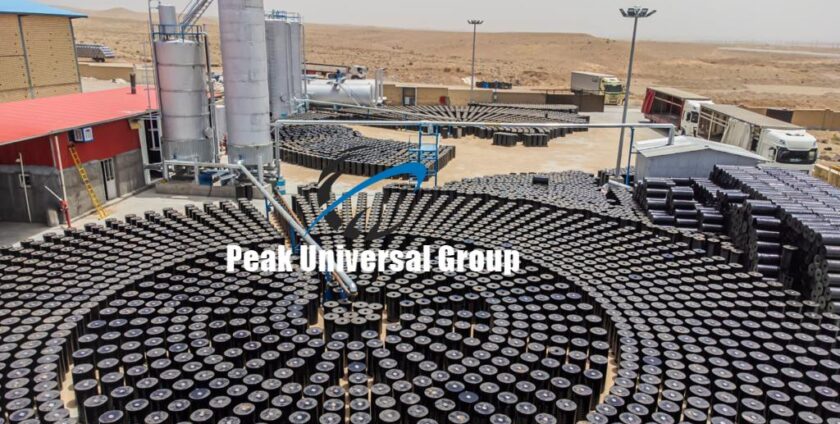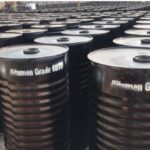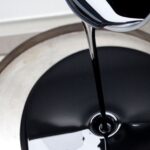
What is Penetration Grade Bitumen? – Properties, Types, and Industrial Uses
Penetration Grade Bitumen is one of the most commonly used binders in the construction and infrastructure industries. It is a thermoplastic, petroleum-derived material that becomes soft when heated and hard when cooled. Its classification is based on its penetration value, which measures the hardness or consistency of bitumen under standardized conditions.
In this article, we explore what Penetration Grade Bitumen is, how it is categorized, its technical specifications, and where it’s used across industries with Peak Universal Business as your supplier, you can be assured of high-quality products that meet industry standards.
What is Penetration Grade Bitumen?
Penetration Grade Bitumen is a standard paving grade bitumen classified by the depth (in tenths of a millimeter) that a standard needle penetrates vertically into a bitumen sample under specific conditions (25°C for 5 seconds under a 100g load). This test determines its hardness and consistency, which are crucial for determining suitability in road construction and other applications.
Definition
Penetration grade bitumen is a type of bitumen classified based on its hardness or penetration capacity. The penetration test, which measures the depth a standard needle penetrates the bitumen under specific conditions, determines its grade. The result, measured in tenths of a millimeter, indicates the bitumen’s softness or hardness. Common grades include 10/20, 30/40, 40/50, 40/60, 60/70, 80/100 and 100/150, where the numbers represent the penetration depth range.
Chemical Composition
Penetration bitumen is a complex mixture of hydrocarbons, predominantly asphaltenes, resins, and oils. Its composition includes:
- Asphaltenes: Provide hardness and contribute to the bitumen’s viscosity.
- Resins: Offer adhesiveness and flexibility.
- Oils: Impart fluidity and workability to the bitumen.
Physical Properties
- Color: Black or dark brown
- Consistency: Varies from semi-solid to solid
- Melting Point: Ranges from 35°C to 65°C, depending on the grade
- Solubility: Soluble in carbon disulfide and specific organic solvents
📏 Common Grades Include:
-
Penetration Bitumen 35/50
-
Penetration Bitumen 40/50
-
Penetration Bitumen 60/70
-
Penetration Bitumen 100/150
-
Penetration Bitumen 160/220
The lower the number, the harder the bitumen. Higher numbers indicate softer grades suitable for colder regions.
Penetration bitumen is classified based on its hardness or penetration value, which indicates the depth a standard needle penetrates the bitumen under specified conditions. Here are short descriptions for the various grades of penetration bitumen, including their typical applications:
1.Penetration Bitumen 10/20
Description: Bitumen 10/20 is one of the hardest grades of penetration bitumen. It has a very low penetration value, indicating high stiffness and hardness.
Applications: This grade is commonly used in very heavy traffic road construction, airfield pavements, and industrial applications where high resistance to deformation is required.
2.Penetration Bitumen 30/40
Description: Bitumen 30/40 is a hard grade with a low penetration value, making it stiff and durable.
Applications: It is used in the construction of high-stress pavements, such as highways, intersections, and other areas subjected to heavy traffic loads.
3.Penetration Bitumen 40/50
Description: Bitumen 40/50 has a moderate hardness, with a penetration value that balances stiffness and flexibility.
Applications: This grade is ideal for road base and binder courses in flexible pavements, providing a durable and resilient surface suitable for moderate to heavy traffic conditions.
4.Penetration Bitumen 40/60
Description: Bitumen 40/60 offers a slightly higher penetration value than 40/50, providing a bit more flexibility while maintaining good hardness.
Applications: It is typically used in similar applications as 40/50, including road base and binder courses, especially in regions with moderate temperature variations.
5.Penetration Bitumen 60/70
Description: Bitumen 60/70 is one of the most commonly used penetration grades, offering a good balance between hardness and flexibility.
Applications: It is widely used in the construction of asphalt pavements, roads, and highways, providing a durable surface for a variety of traffic conditions.
6.Penetration Bitumen 80/100
Description: Bitumen 80/100 has a higher penetration value, making it softer and more flexible compared to lower penetration grades.
Applications: This grade is suitable for use in regions with colder climates where a more flexible pavement is required to prevent cracking. It is also used in the production of asphalt mixtures for light to moderate traffic roads.
7.Penetration Bitumen 100/150
Description: Bitumen 100/150 is one of the softest grades, with a high penetration value indicating significant flexibility.
Applications: It is used in the construction of pavements and surfaces in very cold regions where maximum flexibility is necessary to accommodate thermal movements and prevent brittleness. Additionally, it is used in some industrial applications requiring a softer binder.
Each grade of penetration bitumen has specific properties that make it suitable for different environmental conditions and traffic loads. Selecting the appropriate grade ensures the longevity and performance of the constructed pavement or structure. With Peak Universal Business as your supplier, you can access a wide range of penetration bitumen grades tailored to your project’s requirements.
🏭 How is Penetration Grade Bitumen Produced?
⚗️1. Distillation
The manufacturing of penetration grade bitumen begins with the distillation of crude oil. Crude oil is heated in a distillation column, separating it into various fractions. The heaviest fractions, which do not vaporize, are collected at the bottom of the column. These fractions form the basis of bitumen.
🔬 2. Aeration and Oxidation
The heavy fractions undergo further processing to improve their properties. This involves aeration and oxidation, where air is blown through the bitumen at high temperatures. This process increases the asphaltene content, enhancing the bitumen’s viscosity and hardness.
🧪 3. Blending and Grading
The processed bitumen is then blended to achieve the desired penetration grade. By adjusting the proportions of different bitumen types, manufacturers can produce specific grades, such as 60/70 or 80/100.
✅ 4. Quality Control
The final product undergoes rigorous quality control tests to ensure it meets industry standards. Tests include penetration, softening point, ductility, and viscosity measurements.
📊 Technical Properties of Penetration Grade Bitumen
| Property | Test Method | Typical Value (60/70 Grade) |
|---|---|---|
| Penetration @ 25°C (100g, 5s) | ASTM D5 | 60–70 dmm |
| Softening Point (Ring & Ball) | ASTM D36 | 49–56°C |
| Ductility @ 25°C | ASTM D113 | > 100 cm |
| Flash Point | ASTM D92 | > 230°C |
| Solubility in Trichloroethylene | ASTM D2042 | > 99% |
| Specific Gravity @ 25°C | ASTM D70 | 1.01–1.06 |
🏗️ Industrial Uses and Applications of Penetration Grade Bitumen
🛣️ Road Construction and Paving
Used as a binder in asphalt mixtures for highways, city roads, and rural roads.
Paving and Surfacing
Penetration grade bitumen is extensively used in road construction for paving and surfacing. It binds aggregate particles, forming a durable and weather-resistant road surface.
Road Repair and Maintenance
It is also used in road repair and maintenance, including patching potholes and resurfacing worn-out roads.
🏘️ Building Waterproofing
Used in waterproofing membranes for basements, roofs, and tunnels.
Penetration bitumen is a key material in roofing applications. It is used in the production of roofing felt and shingles, providing waterproofing and protection against weather elements.
Building Foundations
Penetration grade bitumen is applied to building foundations to prevent water ingress and protect structural integrity.
Underground Structures
It is used in waterproofing underground structures, such as basements and tunnels, to prevent water seepage and damage.
🏗️ Industrial Applications
Pipe Coating
Penetration bitumen is used to coat pipes, protecting them from corrosion and extending their lifespan.
Asphalt Production
It is a crucial component in the production of asphalt for various industrial applications, including manufacturing asphalt concrete and bituminous mixtures.
🛢️ Other Applications
Adhesives and Sealants
Penetration bitumen is used in the production of adhesives and sealants, providing strong bonding, and sealing properties.
Damp-proof Courses
It is applied in damp-proof courses to prevent rising damp in walls and structures.
✅ Advantages of Penetration Grade Bitumen
-
🧱 Structural Stability: Provides strong binding for aggregate layers.
-
🌡️ Thermal Flexibility: Performs well across a range of temperatures.
-
💧 Waterproofing: Offers excellent resistance to water penetration.
-
⚙️ Process Flexibility: Easily mixed with aggregates and additives.
-
💰 Cost-Efficient: Readily available and widely accepted in industry standards.
1. Durability
Penetration bitumen provides long-lasting durability, making it ideal for road construction and other applications where longevity is crucial.
2. Versatility
Its versatile nature allows it to be used in various applications, from road construction to waterproofing and industrial uses.
3. Waterproofing Properties
Penetration bitumen offers excellent waterproofing properties, protecting structures from water damage and enhancing their lifespan.
4. Adhesive Properties
It has strong adhesive properties, making it effective in binding aggregates and other materials in construction and industrial applications.
5. Cost-Effective
Penetration bitumen is a cost-effective material, providing excellent performance at a relatively low cost compared to other materials.
6. Thermal Stability
It has good thermal stability, maintaining its properties over a wide range of temperatures, which is crucial for applications in varying climates.
Disadvantages of Penetration Grade Bitumen
1. Temperature Sensitivity
Penetration bitumen can become brittle at low temperatures and soft at high temperatures, affecting its performance in extreme climates.
2. Environmental Impact
The production and use of bitumen have environmental impacts, including greenhouse gas emissions and potential pollution during manufacturing and application.
3. Health and Safety Concerns
Handling and applying bitumen require safety precautions to prevent exposure to fumes and contact with skin, as it can cause irritation and health issues.
4. Aging and Degradation
Over time, bitumen can age and degrade, losing its effectiveness and requiring maintenance or replacement.
5. Limited Flexibility
Compared to polymer-modified bitumen, penetration grade bitumen has limited flexibility, which can lead to cracking under heavy loads or temperature fluctuations.
Price Factors of Penetration Grade Bitumen
1. Crude Oil Prices
The price of penetration grade bitumen is closely linked to crude oil prices. Fluctuations in the global oil market directly impact bitumen prices.
2. Production Costs
The costs associated with refining, processing, and blending bitumen influence its price. Advanced processes and quality control measures can increase production costs.
3. Supply and Demand
Market demand for bitumen in construction, industrial, and infrastructure projects affects its price. High demand can drive prices up, while low demand can lead to price reductions.
4. Transportation and Logistics
The cost of transporting bitumen from production facilities to end-users plays a role in its pricing. Factors such as distance, transportation mode, and fuel costs influence these expenses.
5. Regulatory Factors
Regulations and environmental policies affecting bitumen production and use can impact its price. Compliance with safety and environmental standards can increase costs.
6. Quality and Grade
The specific grade and quality of penetration bitumen also affect its price. Higher grades with better performance characteristics typically command higher prices.
🔄 Comparison with Other Bitumen Types
| Feature | Penetration Grade | Viscosity Grade | Polymer Modified |
|---|---|---|---|
| Measured by | Needle Penetration | Viscosity @ 60°C | Performance Tests |
| Temperature Sensitivity | Medium | Low | Very Low |
| Usage Flexibility | High | Moderate | High |
| Performance in Stress | Moderate | Better | Excellent |
Peak Universal Business: Your Trusted Supplier of Penetration Grade Bitumen
Peak Universal Business is a leading supplier of high-quality penetration grade bitumen, catering to the diverse needs of the construction and industrial sectors. Here’s why Peak Universal Business stands out:
- Quality Assurance
Peak Universal Business ensures that all their bitumen products meet the highest quality standards, providing reliable and consistent performance.
- Wide Range of Products
They offer a wide range of penetration grade bitumen products, including various grades to suit different applications and requirements.
- Customized Solutions
Peak Universal Business provides customized solutions tailored to the specific needs of their clients, ensuring optimal performance and satisfaction.
- Technical Expertise
With a team of experienced professionals, Peak Universal Business offers technical support and guidance to help clients choose the right bitumen products for their projects.
- Sustainable Practices
Committed to sustainability, Peak Universal Business ensures that their products are produced and supplied in an environmentally responsible manner.
- Competitive Pricing
Peak Universal Business offers competitive pricing without compromising on quality, making them a cost-effective choice for customers.
FAQs about What is Penetration Grade Bitumen?
❓ What does penetration value mean in bitumen?
👉 It measures the hardness of bitumen. A lower value means harder bitumen, while a higher value means softer bitumen.
❓ Why are different penetration grades used?
👉 Different climates and traffic conditions require different grades. Hard grades are better for hot regions and heavy loads, while soft grades are suited for colder areas.
❓ Is penetration grade bitumen suitable for all roads?
👉 Yes, but the right grade must be selected based on temperature, load, and environmental conditions.
❓ How is penetration grade different from viscosity grade bitumen?
👉 Penetration grade is tested by needle penetration, while viscosity grade is classified based on flow resistance at set temperatures.
❓ Can penetration grade bitumen be used in waterproofing?
👉 Absolutely. It is commonly used in roofing membranes, tunnels, and basements for its water-resistant properties.
📌 Conclusion- What is Penetration Grade Bitumen?
Penetration Grade Bitumen is a foundational material in modern infrastructure. With its standardized classification system, it provides consistency, adaptability, and performance across diverse industrial applications. From highways to waterproofing systems, its versatility and reliability continue to make it an industry staple.
Whether you are involved in road construction, roofing, waterproofing, or industrial applications, penetration grade bitumen offers the durability, versatility, and cost-effectiveness you need. Choose Peak Universal Business for all your bitumen needs and experience the benefits of working with a reliable and experienced supplier.
You can Read More about Penetration Bitumen Here:
How is Penetration Bitumen produced ?
Penetration Bitumen 80/100 Uses & Its Advantages
Industrial uses of Penetration Bitumen 60/70
What is the penetration bitumen 60/70 & its uses?
Uses of penetration bitumen 40/60
📣 Call to Peak Universal Business
🔍Looking for a reliable supplier of Penetration Grade Bitumen?
📌 We in Peak Universal Business offer:
-
🛢️ All grades (35/50, 60/70, 80/100, and more)
-
📦 Bulk packaging options
-
🧪 Certified test reports and technical support
📧 Email: [email protected]
📞 Phone: +971 4 878 2031
🌐 Visit: PUBLtd.Bitumens
If You have any other Query or Question you want to ask, Please don’t hesitate to Contact Us.
- 0 comment





Leave a Reply